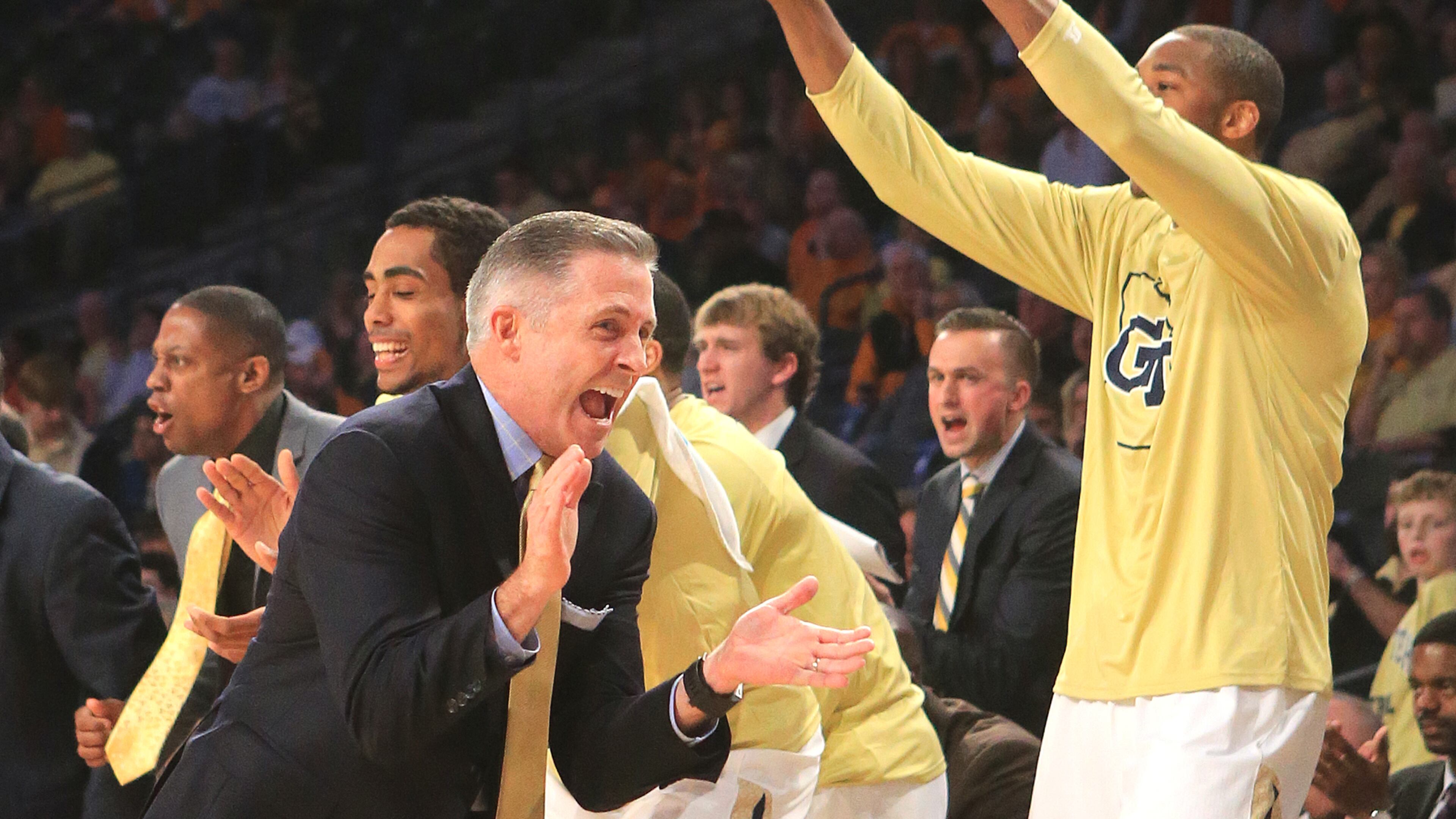5 observations from Tech’s win over Tennessee

Five observations from Georgia Tech’s 69-67 win over Tennessee on Monday night at McCamish Pavilion, which was secured when the Jackets forced the Volunteers to take a poor shot at the buzzer:
Points. After surprisingly scoring 116 points in its season-opening win against Cornell, Tech (2-0) showed a familiar, more deliberate half-court form against Tennessee, quite similar to last year when the Jackets averaged 63.3 points per game.
Part of the lack of offense was the pace of the game compared to the opener. Though a running team, the Vols weren’t as frenetic when they went for 82 in their opener against North Carolina-Asheville. Also contributing to the low total was Tech’s bench, which scored just eight points after scoring 49 against Cornell. The Jackets shot 39.4 percent from the field and had 15 assists on 28 field goals.
The inside-outside game. Nick Jacobs put in a strong performance after a 12 point-five rebound showing against Cornell. Tech tried to get the 6-foot-8 Jacobs going early against the Volunteers, whose starters had a difficult matching up with the 262-pound forward. Jacobs scored seven of Tech's first 11 points and touched the ball on almost every early offensive possession.
“We needed it tonight because he was the only one making any baskets in the first half,” Tech coach Brian Gregory said.
The Vols also also had a hard time against Charles Mitchell, who at 256 pounds is also difficult to move once he gets position. Jacobs finished with a game-high 23 points on 9-of-15 shooting while Mitchell finished with 12 on 5-of-8 shooting with 12 rebounds.
Tech’s Adam Smith, the outside compliment to Jacobs and Mitchell inside, had a difficult time finding his touch, missing 7-of-8 3-pointers. But Marcus Georges-Hunt came through in the second half with 11 of his 17 points. As a team, Tech missed 17-of-19 3-pointers.
Rebounding. Tennessee kept the game close by outrebounding Tech 27-21 in the first half, but it didn't translate to as many points (8). The Vols likely made rebounding a point of emphasis against Tech after being outrebounded by Asheville and used their quickness to find space to tip balls and keep possessions alive. The Vols finished with 16 second-chance points on 24 offensive rebounds.
“Reason we won the game is in the second half we wonly gave them 10 after giving them 14 in the first half,” Gregory said.
Defense on Kevin Punter. After scoring 31 in Tennessee's opener, Punter had just four points on 2-of-6 shooting in the first half against Tech. He began attacking more in the second half, finishing with 9 points. However, he missed two key free throws with 1:19 left that would have tied the game at 69.
Defense overall. Tech was intent on not giving up easy baskets and they could be aggressive because of the inside depth, which was why the Jackets finished with 12 blocks and 10 steals.
On one exchange in the first half, Tennessee’s Jabari McGhee thought he had an alley-oop dunk until James White blocked it from behind, one of his several defensive bursts. Tech turned defense into offense after White’s block and Smith buried a long jumper. Gregory said that block was a big play because it’s a play that good teams make.
“James played well tonight, especially on defense,” Gregory said. “He gives u that versatile forward that we haven’t had. He’s a guy that’s going to make some jumps for us this year.”
The Yellow Jackets played scrappy defense throughout, rarely giving the Volunteers easy looks. After falling behind 53-44, the Jackets limited the Vols to two points in a six-minute stretch to take a 58-55 lead.
Tennessee coach Rick Barnes said his team lost its discipline on offense during that stretch, not moving the ball well enough and forcing poor shots.
Gregory said the added depth and athleticism enables the team to make plays they couldn’t make last year.
“Little faster, little more athletic, got a little more grit,” Gregory said.
With less than a minute remaining, Georges-Hunt made a key stop on a drive by Robert Hubbs III to deny a game-tying score. Mitchell followed that by switching off several ball screens to force a poor attempt on the potential game-winning shot.
“You need to figure out ways to win games,” Gregory said. “Our team tonight figured that out. We got knocked down, we were on the mat there, and we responded.”


